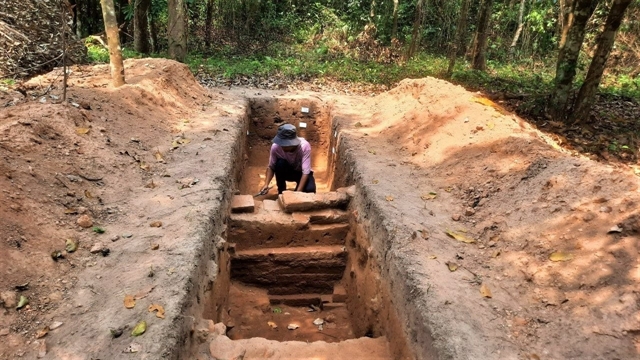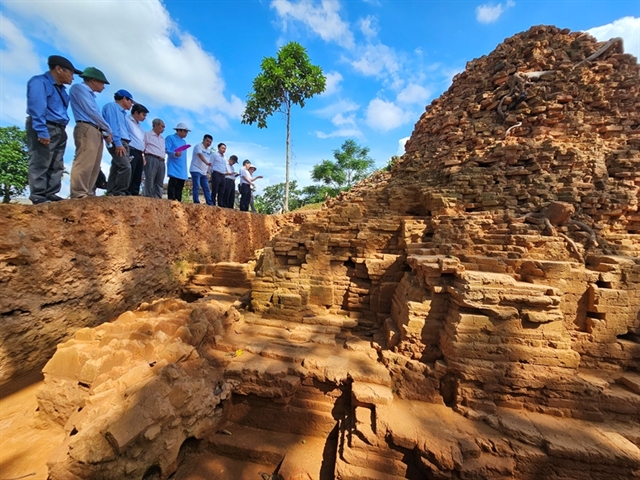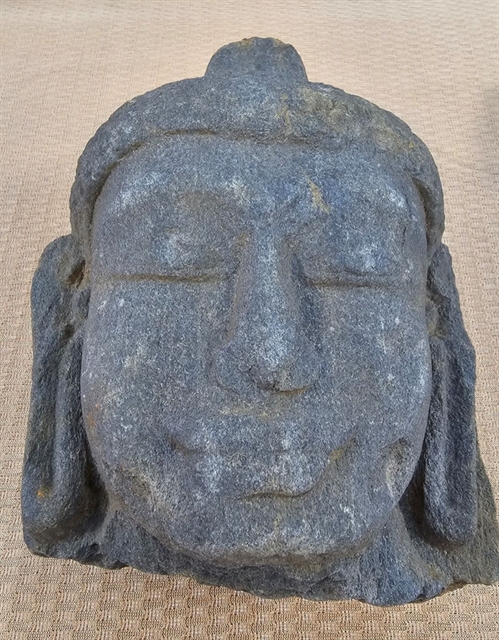 Life & Style
Life & Style

 |
| A large number of artefacts have been unearthed after more than two months of explorations and excavations which were conducted by archeologists and experts from the Department of Culture and Sports of Thừa Thiên Huế Province in collaboration with the National Museum of History. Photo baothuathienhue.vn |
THỪA THIÊN HUẾ — An extraordinary ancient statue relief of a Buddha head is among many artifacts unearthed during the large-scale archeological excavation of Liễu Cốc Twin Tower in the central province of Thừa Thiên Huế, archeologists have announced.
The one-side relief of purple-gray stone dating between 11th - 12th centuries is 20cm in length, 15cm wide and 10cm thick.
It is really a particular item among a large number of artifacts found after more than two months of exploration and excavation by archeologists and experts from the Department of Culture and Sports of Thừa Thiên Huế Province in collaboration with the National Museum of History.
 |
| The stone relief of a Buddha statue head is discovered during archaeological excavations at Liễu Cốc Twin Tower in Thừa Thiên Huế Province. — Photo baothuathienhue.vn |
The artifacts include reliefs, pots, jars and coins of different architectural styles and decorations and were made of different materials such as stele fragments, stone, glazed ceramics and porcelain.
Liễu Cốc Twin Tower, located in Liễu Cốc Thượng Village, Hương Trà Town is a special relic site featuring the spiritual life and culture of Champa, about 1,000 years ago.
The site is also a religious artistic and architectural work marking a period of historical and cultural development of the Vietnamese in general and the Chăm people in particular.
After more than two months of archaeological exploration and excavation, experts determined that Liễu Cốc includes two main temple towers of North and South, but has no sign of a third.
Although it has been seriously degraded and damaged, the temple twin tower is currently being compared to other famous Champa relics in Bắc Mỹ Sơn region in the central province of Quảng Nam and Phú Diên Tower in Phú Vang District, Thừa Thiên Huế Province.
Therefore, the recent archaeological research and excavation will clearly determine the scale, structure, nature and age of the relic to serve the work of planning, preserving, embellishing and promoting its value, experts have said.
Exploration was conducted on four digs over an area of 20 square metres, while each excavation area was around three holes of about 60sq.m.
Nguyễn Ngọc Chất from the National Museum of History, who is in charge of archaeological exploration and excavation, said that the process had been expanded to connect some digs to former a larger site around the architectural foundation of the North Tower.
According to Chất, along with revealing the scale of the architectural foundation of the North Tower and other related architectural vestiges, the excavation had unearthed a large volume of artefacts including more than 4,800 specimens.
Along with the relief of a Buddha statue's head with a round face and half-closed eyes, an ancient coin with square hole in the middle was also found dating back to the 13th century.
“It can be said that this is a collection of precious artifacts. Surely, after being researched, appraised and scientifically documented, it will provide a lot of important information and be very useful for displaying and promoting its value," Chất said.
Meanwhile, many experts and researchers believed that, although the excavation area this time was not large, it had yielded very important results.
Researcher Nguyễn Xuân Hoa, former director of the provincial Department of Culture and Sports, said it was necessary to continue to expand excavations to a larger scale, at the same time having specific solutions to protect the relic.
Phan Thanh Hải, Director of the Department of Culture and Sports also affirmed that he would suggest to the provincial People's Committee to continue expanding the excavation before this year's rainy season. VNS




